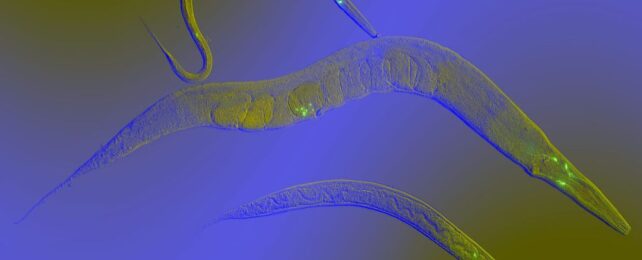Incredible though it may seem, a wriggly roundworm with no eyes, no spine, and no brain to speak of may still possess the most basic of animal emotions.
In recent research, the nematode, Caenorhabditis elegans, has shown a persistent negative reaction when given a quick electric zap. For many minutes after receiving the short and sharp shock, this species continued to 'flee' at high speeds in the laboratory.
Researchers from Nagoya City University in Japan and Northeastern University in the US say that the long-lasting response, which looks like the worm 'running' away, is indicative of a fear-like brain state.
Both the duration and severity of the worm's negative state seemed to be regulated by a specific neural circuit in its simple nervous system rather than direct stimulation of the motor system.
"These properties," the international team writes, "have been recently regarded as essential features of emotion, suggesting that C. elegans response to electric shock may reflect a form of emotion, akin to fear."
The findings join an ongoing debate over whether invertebrates can actually experience primitive precursors to our own emotions.
Recent experiments on crayfish, bumblebees, and fruit flies indicate invertebrates really do have lasting positive and negative cognitive states following specific stimuli, at least to some extent.
More than a century ago, Charles Darwin himself wrote that "even insects express anger, terror, jealousy and love", although that was largely based on the human tendency to anthropomorphize, not on any objective experiments.
To this day, some scientists contend that there is no way to objectively measure emotions and that we should do away with the term completely.
Others think it's important we at least try. In 2014, biologists David Anderson and Ralph Adolphs put forward a framework to measure animal emotion as objectively as possible.
The duo argued that 'emotions' are internal, central states that the animal may or may not be consciously aware, that are triggered by a specific stimulus.
The animal's response to this stimulus, either physiological, cognitive, or behavioral, must meet four main criteria to be considered an emotional one: it must persist after the stimulus is gone, it must increase or decrease with the extent of the stimulus, it must dominate other behavioral responses, and it must be consistent depending on the type of stimulus.
C. elegans seems to meet at least three out of four of these criteria as it wriggles away from the site of shock, which suggests that even worms can experience 'basic' emotions like fear.
In the recent experiments, when worms sensed an electric alternating current for 45 seconds, they continued to move away at high speeds for over 2 minutes.
During this 'fearful' state, when food was placed nearby, the worms ignored the meal and kept scurrying at high speeds, which suggests positive stimuli are somehow suppressed by the negative state.
It also suggests that this emotional response may be generalized, which means the same emotional state can be triggered by different stimuli and that one stimulus can affect responses to others.
The current research only looked at electric shocks, so it can't confirm this, but the severity of the shocks did seem to impact the worm's response.
Even when the shock was just 5 seconds long, the worms 'fled' for 1.5 minutes before eventually returning to their calmer, base state.
When the authors repeated the shock experiments with worms that were unable to produce neuropeptides – equivalent to human hormones – the worms stayed in a high-speed state for longer.
"Because the requirement of neuropeptide signaling [in worms] is reminiscent of neuropeptide regulation of fear in mammals including humans, the fear-like brain state may be regulated by evolutionarily conserved molecular mechanisms," the authors of the study write.
The discovery suggests that C. elegans may be an ideal model for revealing how neural circuits relate to emotion across the animal kingdom.
If there is, in fact, a shared neural mechanism for emotion regulation among animals, research on roundworms could help scientists better understand how persistent negative emotions that cause mood disorders like depression may arise.
Many genes in roundworms are maintained in humans and other organisms, including those that seem to be involved in this 'fear-like' response.
Further research is now needed to determine if roundworms like C. elegans also show positive emotional states based on rewards like food.
The study was published in Genetics.
